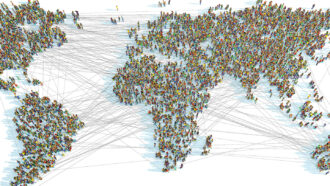
Physics
Physics explains why poured water burbles the way it does
The loudness of falling water depends on the height of the pour and the thickness of the stream.
Come explore with us!

The loudness of falling water depends on the height of the pour and the thickness of the stream.

Lightning, stars, supermassive black holes and more give off radio waves.

The internet has a big environmental footprint. But this new type of tech could help reduce the climate impact of computing.

Breaks in training meant to mimic human sleep helped artificial intelligence learn multiple tasks.

Artificial intelligence is technology smart enough to do tasks that would normally require human brainpower.

Access to the internet is a human right, yet much of the world can’t get online. New tech has to be affordable and usable to end this digital divide.

Tiny spectrometers might someday show up on smart devices. They could help people scan for ingredients or contaminants in foods and other materials.

Researchers are delving into how instruments and spaces shape our experience of music, and how computers could play a role in the future of music-making.

It works by playing soft, calculated sounds to help people protect their privacy from automatic speech-recognition systems.

Of 99 coastal cities studied, nearly one-third are sinking. This leaves coastal communities increasingly vulnerable to rising seas.